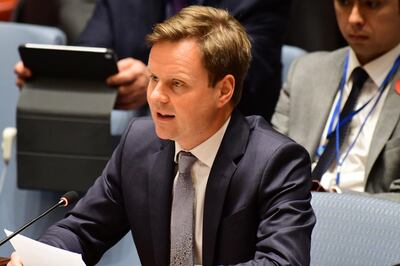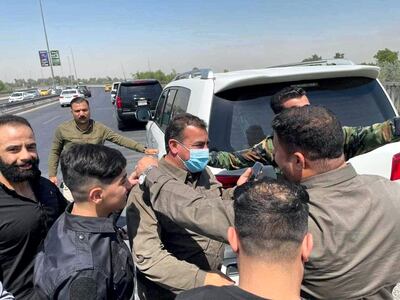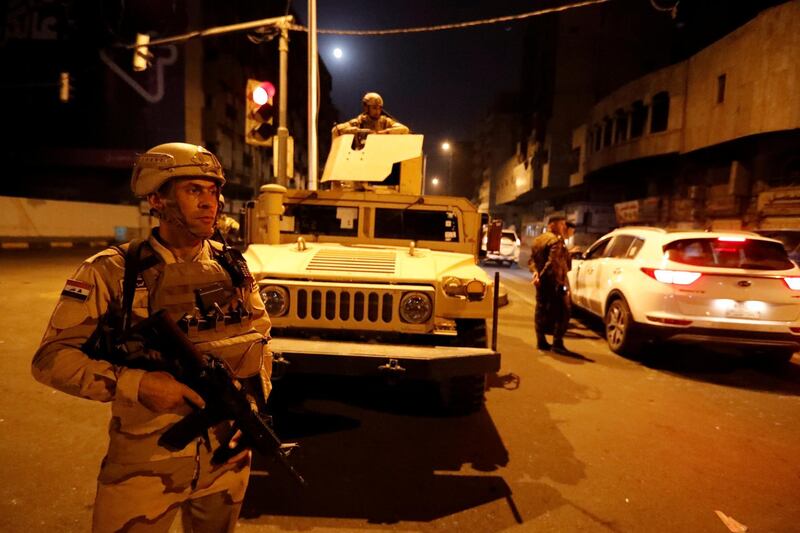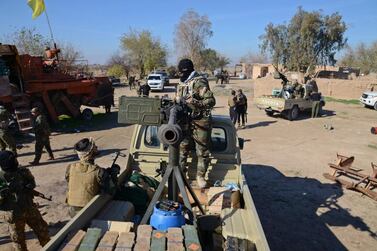Armed militias operating outside state control in Iraq will not bring any stability or prosperity to the country, Britain's ambassador told The National.
The Iraqi government last month arrested a senior militia leader, Qassem Musleh, on suspicion of terrorism and in connection with the targeted killing of civil society activists and protesters.
Mr Musleh leads the Iran-backed Popular Mobilisation Forces (PMF) operations in Anbar.
He was released from government detention on Wednesday after charges against him were dropped because of insufficient evidence.
"As long as armed militia continue to operate in Iraq with impunity, there will not be the stability and prosperity that Iraqis deserve," Stephen Hickey, the British ambassador to Iraq, told The National.
Tensions in Baghdad skyrocketed immediately after the arrest, with PMF fighters taking to the streets around the offices of Prime Minister Mustafa Al Kadhimi, prompting the deployment of Iraqi security forces and the elite Counter-Terrorism Service to protect the government and diplomatic missions.
“We appreciate the government’s efforts to hold these groups to account and call on all Iraqi leaders and politicians to support the government in this regard,” Mr Hickey said.
The stand-off sparked fears of violence as some armed PMF factions gathered at the entrance to the fortified diplomatic Green Zone in Baghdad. But the situation has so far remained stable.
A previous attempt by Mr Al Kadhimi to have PMF fighters arrested led to similar stand-offs and threats of violence before the gunmen were ultimately let free.
Mr Musleh was arrested in connection with the murder of Iraqi activist Ihab Al Wazni, who was shot near his home in the southern city of Karbala.
Hours after his release, the head of Iran's Quds Force, General Esmail Ghaani arrived in Baghdad and held meetings with Shiite political leaders and militia leaders, according to a lawmaker close to PMF.
"The visit has nothing today with Haj Qassem Musleh release, but to discuss the recent developments here especially the tense atmosphere between the government and Hashed," he said.
"All parties agree on calming down things with the government. None wants to escalate," he added without elaborating.

Mr Al Wazni's brother said he was disappointed Mr Musleh had been released.
"We are not feeling justice, but unfairness," Marwan Al Wazni told The National over the phone from Karbala.
"We demand the judiciary system to be fair and not equate the victim and the executioner," Mr Al Wazni added.
The decision to release Mr Musleh was "wrong," he said. "The investigation is incomplete - there are still eight other people at large who face arrest warrants."
The family offered more than one piece of evidence to the authorities, he said, refusing to discuss them in media to preserve the investigation.
Asked what about the family's next step may be, he said "all options are on the table. It is a clear assassination crime and the blood of our martyr will not go in vain."

Baghdad resident Mustafa Abid, who has been protesting since the onset of the pro-reform demonstrations against the country’s political elite, said he has no faith in the Iraqi judiciary or government to bring the killers to justice.
"The judiciary system is politicised, the law is blind and the government is under local and foreign pressures. How can they achieve justice?" he told The National.
For him and many others, the arrest of Mr Musleh was a means of moving attention away from the deaths and injuries suffered by protesters last month.
“It’s a fanfare created to distract the people and make them forget those killed on May 25,” he said. “It’s a play or film and the director and the actors are well known.







